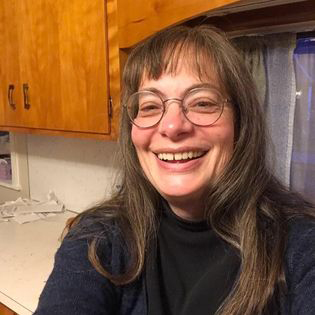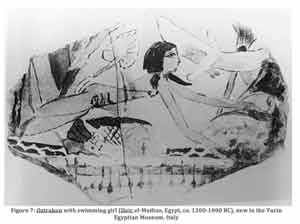Karen Eva Carr
Dept. of History, Portland State University

Professor Carr was a member of the Department of History at Portland State University from 1992-2011; she now has Emerita status and writes full-time. Her research, making use of both archaeology and texts, employs anarchist and feminist theory to reconsider the ancient Mediterranean economy as a series of interlocking systems rather than a government-driven enterprise. She's considering what changes when we recast Europe as 'strange', taking the older cultures of Africa and Asia as the default. You can reach Professor Carr at carrk @ pdx.edu or on Twitter @Quatr_us.
Shifting Currents: A World History of Swimming

Dr. Carr's forthcoming book, Shifting Currents: A World History of Swimming, will appear in March 2022 from Reaktion Books. In it, Carr asks why, when almost everybody in the world was a good swimmer in the Bronze Age, more than half the people in the world today do not know how to swim. Her answer is that non-swimming people from Central Asia - first the Indo-Europeans, then the Turks and Mongols - have slowly spread out over the world, and they've brought their fear of the water with them. The book shows how the Greeks and Romans learned to swim from their Egyptian neighbors, how the people of medieval Europe and China suddenly stopped swimming, and how people all over Early Modern Europe were so unfamiliar with swimming that they floated witches to prove their guilt. When Spanish and British colonizers met swimmers in the Americas and Africa, they dismissed swimming as the sort of thing animals could do. And yet, when a swimming fad swept Europe after Lord Byron swam the Hellespont in 1810, these same colonizers forced people of color out of the water, and claimed the beaches for themselves.
Some recent articles about her swimming work may be found here:
Plato, Privilege, and the Pool (Eidolon 2019)
On Not Swimming (The Rambling 2020)
The Uneasy History of Swimming and Race, as Relayed Through Art (Hyperallergic 2021)
Women, Clothing, and Money: A Feminist Look at the Ancient Economy
Dr. Carr's next book, Women, Clothing, and Money: A Feminist Look at the Ancient Economy is under contract with Liverpool University Press and should be out in 2023. Women, Clothing, and Money argues that Europeans' concept of money was at first feminized and then became masculinized in the Iron Age, and that this explains many seemingly contradictory attitudes in both ancient and modern authors. Furthermore, the marginalization of women in many discussions of the ancient economy distorts our idea of it, leaving out most manufacturing and tipping our view towards Europe and away from Asia and Africa.
An early peek at some of the material for Women, Clothing, and Money:
Leptiminus Archaeological Project
Dr. Carr is also in her second decade as a Roman pottery specialist for the Leptiminus Archaeological Project, working in the modern village of Lamta, in Tunisia. Leptiminus was an important Roman port, and the excavation is one of very few from the Roman Empire to have excavated the kilns where Roman pottery and amphorae were made, soon to be filled with fish sauce (garum), wine, or olive oil and shipped all over the Roman Empire and beyond. The survey material has already been published in the Journal of Roman Archaeology, and the team is now working to process the much more abundant excavation material.
Vandals to Visigoths: Rural Settlement Patterns in Early Medieval Spain
Vandals to Visigoths (University of Michigan Press 2002) was written as a response to Moses Finley and the Cambridge School's insistence that ordinary Roman peasants lived at a subsistence level and were not much tied in to the larger economy. By demonstrating that the fall of Rome did, in fact, seriously damage the prospects of peasants in southern Spain, Dr. Carr also showed convincingly that the Roman economy was not the primitive embryo Finley believed it to be, a view which has been entirely borne out by more recent research.
Quatr.us Study Guides
Dr. Carr writes and publishes a children's encyclopedia of history and science, Quatr.us Study Guides, which has been serving tens of thousands of children every day since 1995. With more than two thousand articles, Quatr.us is a major resource for middle school students all over the world, and has won numerous awards, including the Encyclopedia Britannica's Web's Best Sites award for 2009.
Archaeological Institute of America, Portland Society
Dr. Carr was the founder and long-time president of Portland's society of the Archaeological Institute of America. The AIA has been sponsoring these lectures in dozens of locations all over the United States and Canada since 1884, as well as providing scholarships to archaeology students, funding excavations, and advising the US government and army regarding archaeological preservation. The Portland Society presents six to eight free public lectures on archaeological topics every year, now on Reed College Campus.
PDX Free Store
When she's not involved in historical or archaeological projects, Dr. Carr is also the founder and organizer of the PDX Free Store, an offshoot of Occupy Portland. We hold monthly gatherings where anybody can come drop off or pick up household goods, clothing, toys, plants, and books. Everyone is welcome; no need to donate in order to take things home. A free lunch is (usually) provided. Find us at https://www.facebook.com/groups/365603686842843/